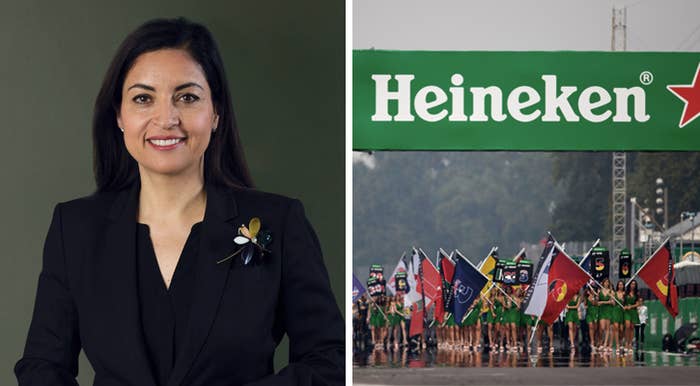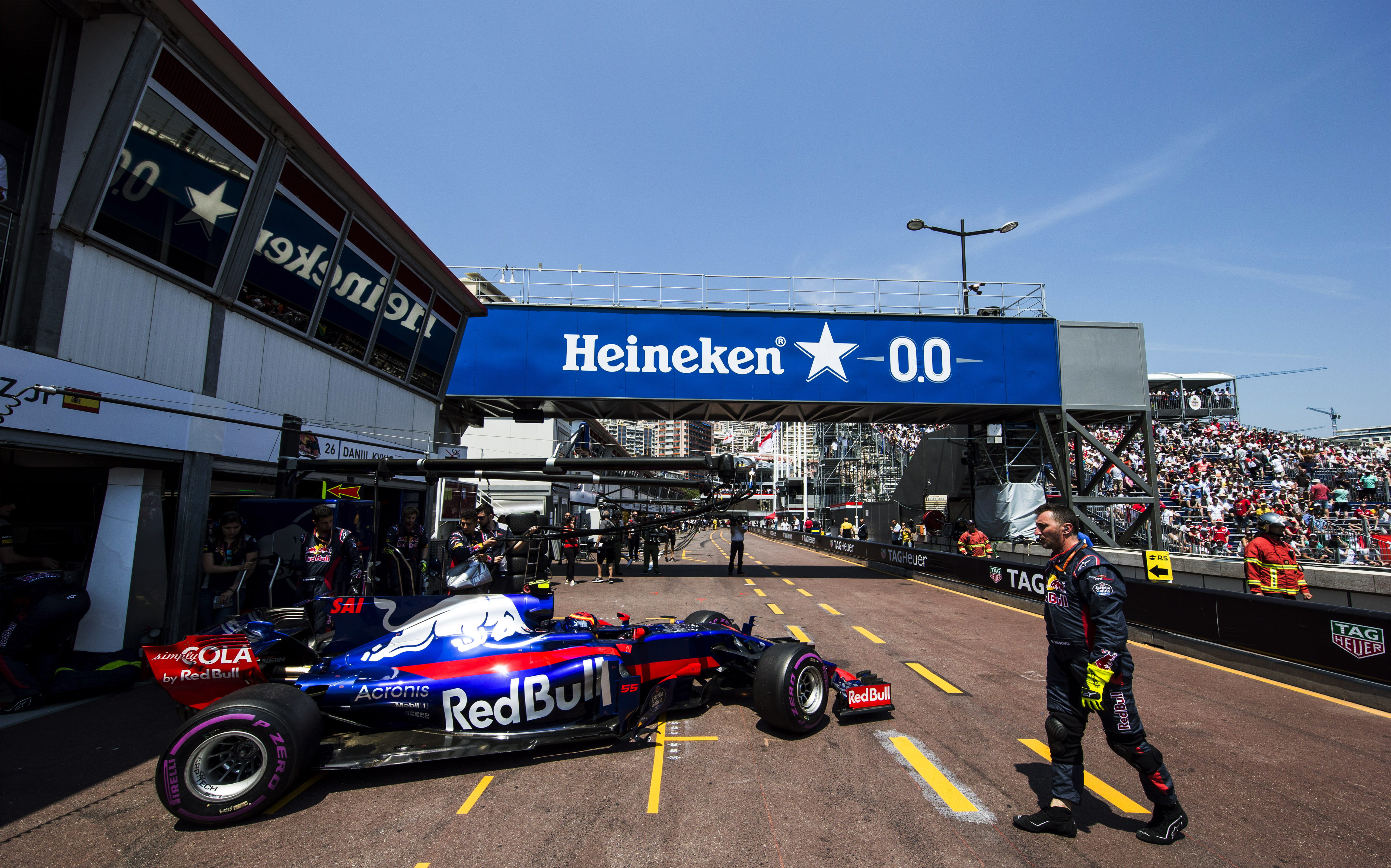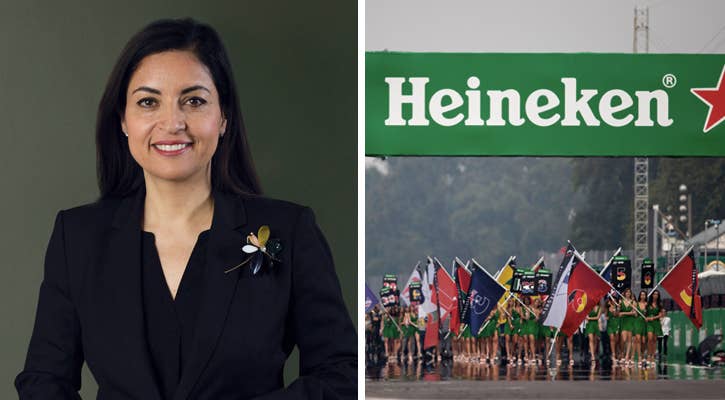
Heineken, as one of the official sponsors of Formula One is shining a light on stereotypes within the sport and opening it up to new audiences through its campaign ‘More than a Race’.
With this in mind we spoke to Blanca Juti, the Head of Corporate Affairs at Heineken, who herself understands very well the challenges of a male-dominated work environment and is something of a trailblazer as one of the few but growing numbers of women in the beer and technology industries who are helping to shape the future of what those worlds look like.
Interview:@LewisScrafton
How did you get into what you do?
My career hasn’t followed a conventional path. I am a very curious person and there is a fair amount of serendipity in my career and life. I am an Anthropologist with a PhD in literature who has been a diplomat, has done sales, marketing, investor relations and communications roles. Prior to Heineken I worked in technology at Nokia and then in gaming and entertainment as the Chief Brand Officer of Rovio, the company behind Angry Birds.
What does being Head of Corporate Affairs at Heineken entail?
At Heineken, the Corporate Affairs team drives our communications, public affairs, brand PR and what is closest to my heart: sustainability. We understand that our operations make an imprint in the world and we strive for that to be as positive as possible. Our sustainability framework is called Brewing a Better World. We strive to reduce our environmental footprint, advocate responsible drinking behaviour and to work and support with the communities around the world where we operate.
We also play a role in ensuring that Heineken story is kept alive. For instance, in the Heineken Experience in Amsterdam, we tell the story of Heineken's heritage to visitors from all over the world. Last year we welcomed over 1 million visitors. It’s exciting to see that younger generations are increasingly interested in our history. And that's great to see, because there is no future without past.
What is the ratio of men to women in your field?
The beer industry and also technology are traditionally more male dominated environments. But things are changing. Millennial men and women don’t want to be trapped by gender stereotypes and they are looking for work in places that understand that. I have also not wanted to be boxed in by my gender. I love being a woman but I don’t want to be limited by expectations and stereotypes and likewise I don’t want to limit men or women. Everyone should feel free to choose their own path. At Heineken we have always been a very inclusive company with many nationalities working together. Increasingly women are taking leadership positions too and I have felt both welcomed and respected by my colleagues.
Being a woman in a “man’s world”, as you say, can be a challenge, but only if you let it be."
How have you found being a woman in what is considered “a man’s world”?
Being a woman in a “man’s world”, as you say, can be a challenge, but only if you let it be. I understand that I am who I am. I am a woman. I am Latin American. I am an Anthropologist. These are the facts behind who I am and thus I have been true to myself and have always played the cards I’ve been dealt in my career. I have felt this has not stopped me at all.
Have you had to overcome sexist barriers to get to where you are today?
Bias is everywhere in life – be it sexism or otherwise. We all have certain biases that we need to learn to fight. There are times in my professional and personal life Where I have seen a bias surface. Being aware of this is helpful: you can address it straight on. Likewise I try to be aware of my biases. Everyone has them and being aware of them is important.
How do women react to your job?
I think in general, as a positive role model. I like to feel I can support other women to reach their potential wherever this may be. This is of course something I feel in general for the next generation, both men and women. I want to be available to support them in their journey.
And how do men react to your job?
I think in general, also positively. There are two of us ladies at the Heineken executive team and we work very well as a team all together. There is enormous respect and deep collaboration. I can say the same for my Corporate Affairs Team. At the moment, my management team is more male dominant but the pipeline coming up is very even. We have enormous talents representing both genders and many nationalities; although I would like to see more from Asia and Africa.
Sheryl Sandberg has done a good job of describing how ambition in women is seen as aggressive or pushy whereas in men it is seen positively."
What is the biggest misconception about women in leadership roles?
Sheryl Sandberg has done a good job of describing how ambition in women is seen as aggressive or pushy whereas in men it is seen positively. A well known study of gender from Harvard proves the point. When a CV has the name Howard, students say that is the person they want to be. When the same CV is presented as Heidi, she is seen as too pushy. Bias in ingrained early on. The expression “running like a girl” understood already by children of young ages to mean slow, is an example of that. If you ask kids to draw a president or a banker vs a nurse or a teacher, you will get men for the first roles and women for the second. In interviews like this, we ask female executives what it is like to be a female executive, but not men executives. Women in sports and entertainment are paid less.
I think things are beginning to change. And I think it is important to support that change.In reality such gender stereotypes don’t only hurt women. They also hurt men because they constrict them in what they want to be, show or experience.
What is the best piece of business advice you have been given?
At one point in my career my then CEO asked me how old I was. It was a cheeky question and I asked him why it mattered. I was in my mid thirties and was successfully leading an investor relations team. I felt I had a dream job and was definitely not looking for anything else. His advice was: if you don’t explore other things before you are 40 you will be pigeon holed in your current role. He was right. A career in sales and marketing followed and now Corporate Affairs. I am so glad I took his advice!
Describe a typical day at work for you.
There is no such thing as a typical day for me. It’s so varied, that’s why I love it. I could be talking to a government official or an NGO, looking at different technologies to further our sustainability agenda, working with our marketing colleagues with our responsible drinking campaigns, , speaking to media, writing my blog, having a beer with colleagues at the end of our bootcamp or if I am very lucky presenting the trophy to a winning F1 Grand Prix driver!
Did you have any female role models growing up?
I have had many, male and female. My parents taught me to not set limits to myself and they supported us girls in equal measure to the boys. My mother tells a story how under two I climbed a very big slide and then let myself slide down. She was fearful. It was many meters high and this slide was certainly not meant for toddler. But she did not show her fear. I have always lived by that spirit.
Many people are waiting for the next step or promotion as if life were simply linear."
What advice would you give to young people interested in following in your footsteps?
I always tell my kids life is not a train where you board and wait for the conductor to tell you you have reached your destination. There are many choices to be made and they are for each individual to make. Many people are waiting for the next step or promotion as if life were simply linear. I have instead wanted to be led by curiosity and a desire to learn something new, rather than the next step. The most important thing for me, is that one truly enjoys life and lives by one’s values.
Can you tell me about Heineken's involvement in F1?
Last June, we announced Heineken’s global partnership with F1 Management. This unique partnership is in line with our long-standing sporting platforms - UEFA Champions League and Rugby World Cup – where we focus on connecting and elevating the passion of the fans that enjoy our product while they watch the action at home or in bars, and not associating our brand with what is happening on the field of play. Together, our goal is to bring more people into the exciting world of F1.
Our story around this partnership is two fold: a brand campaign aimed at driving commercial opportunities, and a new and innovative take on our responsible consumption platform.
‘More Than a Race’ centres on the insight that F1 is not just a 2-hour race, but a 72-hour spectacle of glamour and excitement, taking place in some of the world’s greatest cities. We’ll also use our F1 partnership and activities to communicate our ‘Enjoy Heineken® Responsibly’ programme and “When You Drive, Never Drink” messaging. Through this platform, our goal is to clearly advocate to consumers “When You Drive, Never Drink”.

What makes F1 "More Than a Race"?
We know that F1 is so much more than a 2-hour race. It’s a weekend-long spectacle of glamour and excitement, taking place in some of the world’s greatest cities throughout the year. Through “More Than A Race” we want to bring more fans into the world of F1 and bring to life the spectacle, drama, entertainment and technologies of this world-class property for more consumers – and more customers – around the world. HEINEKEN is opening up F1 to new audiences, and making the sport more accessible for all.
Heineken is involved with the UEFA Champions League, but what is it about F1, and its global appeal, that makes it such a great fit?
F1 and the UEFA Champions League are highly complementary – they are both premium, iconic platforms that together present us with opportunities to engage with existing and potential consumers in important growth markets. Champions League is very strong in Europe and we have been able to make it quite strong in Africa and in Asia Pacific. But F1 is, of course, much stronger in Asia Pacific – and is growing in North America.
Heineken was “born” in Europe and raised by the world – which makes the addition of F1 footprint and its global fan base the perfect addition to our partnerships roster. It is a global event, and one of the greatest global entertainment platforms that engages 3.2 million attending fans and 400 million unique television viewers each year. This gives Heineken the opportunity to expand the reach of our responsibility messaging to more consumers in new places – and in new ways – where they’re not used to seeing us.
Read more about how Heineken, as one of the official sponsors of Formula One, is shining a light on stereotypes within the sport here.

